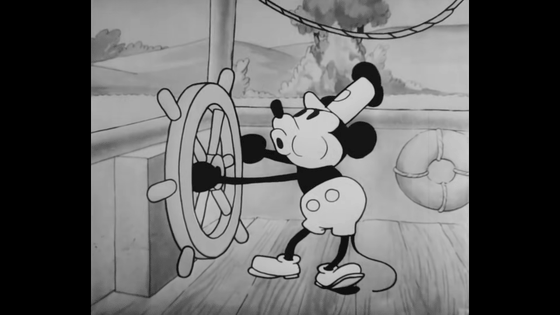Mickey will be in the public domain in 2024, and what is the history of the 'triangular relationship' between Disney and copyright for about a century?

by
Mickey Mouse, who appeared in `` Steamboat Willie '' in 1928, will finally enter the public domain on January 1, 2024, after repeated copyright protection extensions. Jennifer Jenkins, director of Duke University's Public Domain Research Center, explains the close ``triangular relationship'' that connects Mickey, Disney, and the public domain for 95 years since its debut.
Mickey, Disney, and the Public Domain: a 95-year Love Triangle | Duke University School of Law
https://web.law.duke.edu/cspd/mickey/

Mickey Mouse is a character that first appeared in ``Steamboat Willie'' released in 1928, so it will become public domain when the copyright protection period for ``Steamboat Willie'' expires. In addition, 'Steamboat Willie' itself has already been officially released for free as a public domain in Japan.
'Celebration! Mickey Mouse' Steamboat Willie - YouTube
The first copyright law enacted in the United States in 1970 stipulated the period of protection to be ``14 years.'' Mickey Mouse is said to be the reason why the copyright protection period has been repeatedly extended, and the Copyright Extension Act of 1998, which extended the copyright protection period to ``95 years,'' was called the ``Mickey Mouse Life Extension Act.'' It is also known as the 'Mickey Mouse Protection Act.' Many scholars have criticized this extension as an 'economically regressive measure that will have a devastating impact on the ability to digitize, archive and access cultural heritage.'
Jenkins points out that Disney, which has protected Mickey Mouse from entering the public domain, is ``a talented and successful practitioner of utilizing the public domain.''
For example, ` `Frozen '' was inspired by Hans Christian Andersen's fairy tale `` The Snow Queen, '' while `` The Lion King '' incorporated Shakespeare, the Bible, other epic poems, and public domain classical music. , and makes clever use of famous classics whose copyrights have expired. In the first place, Walt Disney said in an interview that Mickey Mouse's movements were imitated by silent movie stars such as Charles Chaplin and Douglas Fairbanks . Furthermore, the title ``Steamboat Willie'' comes from the movie `` Keaton's Steamboat ,'' starring Buster Keaton , which was released earlier in the same year. Mr. Jenkins explains that he uses 'movements of people and characters' and 'titles' that are not protected by copyright.

Disney is both a top player in lobbying for extensions of copyright protection and in aggressively using the public domain, and Mickey Mouse is the symbol of each. Therefore, Mr. Jenkins describes this as a 'love triangle.'
Regarding what will and will not continue to be possible after ``Steamboat Willie'' becomes public domain in January 2024, Jenkins said, ``Ironically, it can be illustrated by a mouse-shaped diagram.'' This is explained in the diagram below. As shown in green in the image, the Steamboat Willie movie and the 'Mickey Mouse 1.0' that appears there are in the public domain, so you can freely copy, share, and modify them. However, it must be used in a way that does not include 'later versions of Mickey Mouse' or 'trademarks' shown in orange.

Since Mickey Mouse's first appearance, he has undergone many minor changes, including his eyes, nose, and trademark '

However, not all Mickey Mouse works after 'Steamboat Willie' are individually copyrighted. Copyright only applies to 'original and creative expression,' so distinctive designs like Mickey Mouse in his wizard costume from ' Fantasia ' are likely to be protected, but ears Changes in the size of the nose or the shape of the nose may be considered ``just minor variations'' and may not be protected. Also, although Mickey Mouse in 'Steamboat Willie' is black and white and does not speak, there is no problem with using your own color scheme or giving him your own voice.
Another important point is the issue of trademarks. Disney claims that the name 'Mickey Mouse' is trademarked and cannot be used freely even after copyright protection has expired. However, copyright and trademark rights are different, and trademarks prohibit 'use in a manner that is likely to confuse, mislead, or deceive consumers,' so Mickey Mouse is in the public domain. It is OK as long as it clearly states that it is not a Disney work. The United States Supreme Court has clearly stated in past precedents that ``trademark rights cannot be used to block the freedoms granted by copyright expiration.''
While Disney was fiercely protective of its characters and works, including Mickey Mouse, it was also richly inspired by the public domain. And from January 2024, Mickey Mouse will also become public domain, and it will be incorporated into the cycle of ``receiving ideas from the public domain, and the works that are created in that way become public domain.'' Mr. Jenkins said, ``Mickey Mouse will step into the realm of the public domain, which Disney has benefited greatly from. Let's hope that at this time, Disney will not forget its debt to the public domain.'' I am.
◆Forum now open
A forum related to this article has been set up on the GIGAZINE official Discord server . Anyone can write freely, so please feel free to comment! If you do not have a Discord account, please create one by referring to the article explaining how to create an account!
• Discord | 'What do you think will happen if Mickey Mouse becomes public domain?' | GIGAZINE
https://discord.com/channels/1037961069903216680/1186604254757142538
Related Posts:







